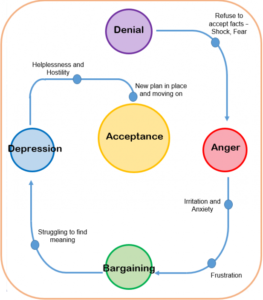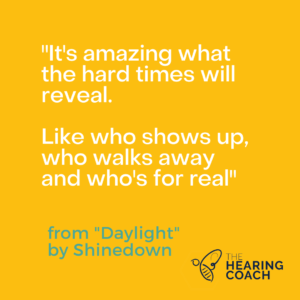When we first experience tinnitus we (hopefully) find that friends rally round to support us both emotionally and physically. That might be through attending medical appointments with us, or spending time with us, or simply checking in regularly to make sure we’re ok.
But, as we all know, tinnitus is not a quick fix. As we travel further on our tinnitus journey we may find that support from some of our friends starts to fade.
In a way it’s understandable, but boy it hurts!
It takes effort to be sympathetic towards another person long-term. That is made all the harder when that person has an invisible illness like tinnitus. If we were to have a broken leg our friends would notice the very obvious difficulty we would have managing life on crutches and be reminded to offer practical and emotional support. But with tinnitus where no-one else can hear it, is hard to remind people that we are suffering without coming across as a serial complainer.
Sometimes there’s an intentional withdrawing of support by people we’re close to. Let’s say a friend hears that your ENT doctor has told you “you’ve just got to learn to live with it” and has zero empathy for how hard that actually is. They can’t understand why you are not throwing yourself back into life with abandon, and they decide they don’t want to hear about your tinnitus challenges anymore. So they stop reaching out or returning your calls or messages.
More often the will to support us simply starts to fall down the list of everyday priorities that our friends have. Our tinnitus doesn’t stop them from having their own challenges, from having a busy time at work, or from having a social life for that matter. The check-ins become less frequent. The online chats start to peter out. We might see social media posts of them having a great time on a night out and realise that not so long ago we would have been there right beside them. Now we’ve not even been invited.
And that hurts. As our friends move on with their lives whilst we feel stuck in a nightmare, it is easy to feel disappointed and even betrayed by them. It’s important we allow ourselves to feel those feelings rather than suppress them with false bravado: “well, I never really liked them anyway”…
For many of us this stage in our tinnitus journey can feel like we’re experiencing a loss. Simply put, we need to grieve. The typical model of grief is one developed by Elizabeth Kubler-Ross and has 5 stages:
Although these stages are depicted as a linear progression, the grief process doesn’t really work like that. You might think you’ve got used to a friend disappearing, then they’re tagged into something on social media and the hurt and grief rises to the surface again. That’s entirely natural.
It does get better. And gradually you will start to accept that those friends who have stopped contacting you or including you are not the friends you need right now. They might have been amazing friends for many years. But they don’t have the headspace, time or emotional wherewithal to support you in this time of need. It’s time to create a new support network.
There will be some lovely, compassionate people who DO want to stick around and support you for as long as you need them. They might be friends you have had for years, or they may be new faces that you have met on your tinnitus journey.
They might be friends who you meet face-to-face, or they might be friends who you meet on the phone or online. All are equally valid. If they get you, they get you. That’s what counts.
And you’re realise that you deserve to reserve your time and energy for those friends, and not the friends who have walked away.



